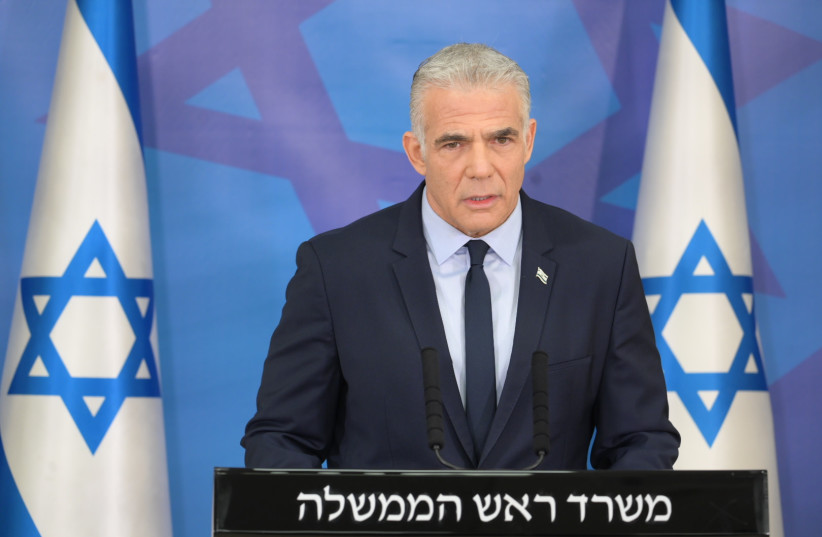The West will show weakness if it does not stop nuclear talks with Iran now, Prime Minister Lapid told American and European interlocutors on Thursday.
According to a very senior diplomatic source, “The EU sent Iran a final offer, which does not comport with the principles to which the Americans committed, and established that the offer was ‘take it or leave it.’ Iran refuses the offer, and therefore the time has come to get up and go. Anything else sends a message of weakness.”
Lapid relayed that message to German Chancellor Olaf Scholz, US Ambassador to Israel Tom Nides and chairman of the US Congressional Subcommittee on the Middle East Rep. Ted Deutch (D-Florida) on Thursday, according to the source. National Security Adviser Eyal Hulata plans to do the same in meetings in Washington next week.
Now is the time to discuss what to do moving forward to prevent Iran from developing a nuclear weapon, the source said.
“Israel, as everyone knows, is not obligated by anything and will do what it needs to stop a nuclear Iran and prevent Iran from using its terrorist proxies in the region,” the source added.
Lapid’s phone calls came days after Iran responded to what was meant to be a final text of a renewed nuclear deal that the talks’ coordinator, the European Union, tabled by continuing to seek changes.

The US said it was reviewing Iran’s response, which it received from the EU, as the talks are indirect at Tehran’s insistence.
Iran continued to demand guarantees from the US that future presidents will not leave the deal as Donald Trump did in 2018. However, US President Joe Biden cannot legally make that commitment.
In addition, Iran seeks a guarantee that after sanctions are lifted, Western corporations will do business with the Islamic Republic, which again, is something that free-market economies cannot promise.
Iran did not, however, respond to an EU compromise relating to Tehran’s demand that the International Atomic Energy Agency end its investigation into traces of nuclear material found at undeclared sites.
The EU’s final draft stated that parties to the agreement would not oppose the closing of the investigation if Iran gives credible responses as to the origin of the nuclear traces by the time a deal is implemented. This goes against US and E3 statements opposing the politicization of the IAEA.
The senior source in Jerusalem said, “The IAEA report from the end of May says that Iran is not giving credible explanations on the open [investigations], which should light a bright red light for the international community.”
The E3 and US backed a statement by the IAEA Board of Governors calling on Iran to answer the nuclear watchdog’s questions, adding that Iran had shut down the agency’s monitoring cameras in the country.
The 2015 Joint Comprehensive Plan of Action lifted sanctions on Iran, allowing the flow of billions of dollars into its economy, in exchange for limitations on its nuclear program. These limitations would expire over time, ending in 2030, with restrictions on the manufacture of advanced centrifuges expiring next year.
The Trump administration left the deal in 2018, opting for more sanctions instead. The Biden administration began negotiating a return to the JCPOA early last year.
The renewed deal, as drafted by the EU, does not extend the JCPOA’s nonproliferation benefits, while offering the same sanctions relief as in 2015.
Lapid and Scholz
Lapid and Scholz spoke on Thursday, two days after Palestinian Authority President Mahmoud Abbas said in a press conference with Scholz that the Palestinians had suffered “50 Holocausts” because of Israel.
Scholz said it was important for him to clarify this personally to Lapid and publicly.
Lapid thanked him for this, as both Israel’s prime minister and as the son of a Holocaust survivor.
“[I] spoke with Yair Lapid on the phone today and assured him that Germany and Israel have a close partnership,” Scholz tweeted. “Our position is clear: We condemn any attempt to deny or play down the importance of the Holocaust. I look forward to welcoming Yair Lapid to Berlin soon.”
On Wednesday, Scholz tweeted, “I am disgusted by the outrageous remarks made by Palestinian President Mahmoud Abbas. For us Germans, in particular, any relativization of the singularity of the Holocaust is intolerable and unacceptable. I condemn any attempt to deny the crimes of the Holocaust.”
